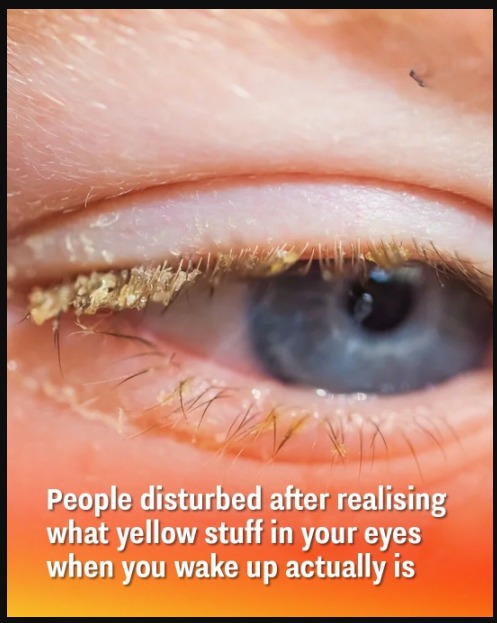Have you ever wondered about the sticky yellow goop that gathers in the corners of your eyes when you wake up? Commonly referred to as “sleep” or “eye discharge,” this phenomenon is a normal part of your body’s overnight housekeeping. But behind this seemingly minor detail lies a fascinating biological story. According to neuroscientist Andrew Huberman, what you’re seeing isn’t just random gunk — it’s a carefully coordinated byproduct of your body’s defenses working tirelessly while you rest.
During the day, your eyes are constantly exposed to dust, bacteria, and other microscopic debris. To protect themselves, your eyes secrete a thin layer of mucus and oils, keeping the surface moist and clean. Blinking acts as a natural windshield wiper, spreading tears and clearing away unwanted particles. However, while you sleep, your eyes stay mostly closed and blinking stops altogether. This pause allows mucus, oils, tiny fragments of dead skin cells, and environmental debris to accumulate without interruption.
One particularly interesting aspect, as Huberman points out, is that this discharge also contains dead bacteria. Throughout the night, your immune system continues to patrol your body, including your eyes. If any harmful bacteria made it into your eyes during the day, your immune defenses — particularly white blood cells — go to work, attacking these invaders. What’s left behind is a battlefield aftermath: the remains of dead bacteria and immune cells, mixed into the yellowish gloop you find in the morning. Huberman poetically describes it as “the casualties of a war” fought to keep your eyes healthy while you slept.
The yellow color you notice mainly comes from the byproducts of this immune battle. Dead neutrophils (a type of white blood cell) and the remnants of bacteria release enzymes and pigments that tint the mucus a yellowish or sometimes slightly green color. It’s a vivid reminder that even when you are at your most vulnerable — sound asleep — your body’s defense mechanisms are wide awake, ensuring that infections and irritants don’t get a foothold.
Typically, waking up with a small amount of eye discharge is perfectly normal and not a cause for concern. It’s your body’s efficient way of clearing waste and maintaining ocular health. However, the situation changes if you notice significant differences — like an unusually large amount of discharge, a thick green or yellow color, or symptoms like redness, itching, or burning. These could signal an eye infection such as conjunctivitis (commonly known as pink eye) or even more serious conditions. In such cases, medical evaluation is important, as some infections can be highly contagious and require targeted treatment.
Interestingly, understanding this simple biological process can deepen your appreciation for how intelligently our bodies operate, even when we’re not conscious of it. What seems like a minor annoyance — wiping your eyes first thing in the morning — is actually the final step in an overnight process of surveillance, cleaning, and defense. Next time you wake up and wipe away that familiar crust from the corners of your eyes, you might just take a second to thank your immune system for pulling an all-nighter on your behalf.

